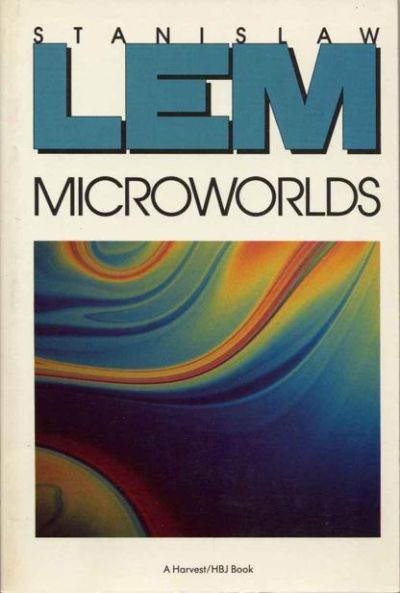Rebuke the Stormy Wind
Microworlds
By Stanislaw Lem

25 May, 2023
Stanisław Lem’s 1986 Microworlds: Writings on Science Fiction and Fantasy is a collection of essays, most of which concern science fiction.
One cannot help but notice that Lem seems to focus on comfortably distant US SF for his more barbed rebukes, rather than the closer at hand Soviet SF. Perhaps US SF offered a vexing combination of flaws and global prominence. Perhaps Lem didn’t care to see if critiquing Soviet SF by well-connected authors would be rewarded by a midnight visit from the KGB.
I was surprised to find that Lem disliked the New Wave almost as much as the SFWA Old Guard did, although for different reasons. The Old Guard seems to have been motivated at least in part by fears of a zero-sum game — readers lost to Empire Star wouldn’t buy A Thunder of Stars—whereas Lem sees the New Wave as inherently reactionary and uncreative, recapitulating ideas already well-chewed by other genres and that decades ago.
On the one hand, Lem has very narrow, very specific views about what constitutes proper SF, coupled to unshakable convictions about the proper ordering of society, literature, and the arts in general. How precisely Lem arrived at these convictions is unclear — some appear to be conclusions treated as axioms — and one gets the general sense that while fate landed him in a Communist country, Lem would have been more comfortable in a society that didn’t pay lip-service to egalitarianism, intellectual or otherwise.
On the other hand, many of Lem’s complaints about American commercial SF — the limits imposed by economic realities, the disinterest many SF authors showed in actual science, their lack of broader intellectual curiosity, the disproportionately high regard in which SF authors and fans hold a genre almost entirely decoupled from reality — are bang on the money. These issues are probably intractable if only because people writing for a commercial market either have to adjust to its demands or give up on being published. One can see why Lem’s complaints might have touched a sore nerve.
Given some of Lem’s views, it would have been enormously entertaining to have him discuss SF with luminaries like Knight, Benford, and Blish, or even more maliciously, an assortment of Puppies. One cannot envision him agreeing to this, alas, and the fact that a number of the people mentioned are dead is a further impediment to this highly entertaining proposal.
At least readers can console themselves with this text, which rewards reading1. Even better Microworlds: Writings on Science Fiction and Fantasy is available here (Amazon US), here (Amazon Canada), here (Amazon UK), here (Apple Books), and here (Barnes & Noble). I was unable to find it at Chapters-Indigo.
The essays:
Introduction (Microworlds) essay by Franz Rottensteiner
A comparatively lengthy and detailed introduction to this work. Among other points of interest, Rottensteiner touches on the Lem Affair, the controversy concerning Lem’s ouster from the Science Fiction Writers of America, either because certain SFWA members were offended by Lem’s criticism of US SF, or because Lem did not qualify for his honorary membership. Rottensteiner inclines to the first claim. Discussion of the affair may be found here, here, and here.
Rottensteiner and Lem later appear to have to come to a parting of ways.
To be honest, it would not be entirely surprising if hurt feelings played a role, inasmuch as certain SFWA members once orchestrated a No Award out of irritation that stories from Damon Knight’s Orbit attracted too many awards. That hurt their poor little fee-fees. It is also possible that the issue really was that Lem did not meet the qualifications for an honorary membership.
Reflections on My Life
Lem provides a brief but event-filled autobiography, having the misfortune to live in Poland, center stage for many unpleasant moments in recent European history.
On the Structural Analysis of Science Fiction
A foray into categorization, in the course of which Lem makes his distaste for fantastical “science” fiction not rooted in the real world very clear.
Science Fiction: A Hopeless Case – With Exceptions
Lem examines why so much American SF is utterly rotten and provides reasons why, despite one or two exceptions to the general tendency of US SF to be awful, he does not expect this situation to improve.
Philip K. Dick: A Visionary Among the Charlatans
Lem’s introduction to Ubik, one that extols Dick’s strengths and techniques while acknowledging the author’s flaws.
The Time Travel Story and Related Matters of Science-Fiction Structuring
An examination of time travel stories, accompanied by complaints about the essential emptiness of American commercial SF.
Metafantasia: The Possibilities of Science Fiction
An exploration of the structural and epistemological options to which writers may turn, accompanied by complaints about the structural and epistemological options to which commercial SF authors often do turn.
Cosmology and Science Fiction
Lem observes that delays in publishing have rendered obsolete the cosmology text on which he is commenting. This should not be an issue for commercial SF authors, however, as they hardly ever concern themselves with real world science.
Todorov’s Fantastic Theory of Literature
Lem examines Todorov’s criticism, graciously pointing out all the ways in which Todorov is incorrect.
Unitas Oppositorum: The Prose of Jorge Luis Borges
An examination of Borges’ work.
About the Strugatskys’ Roadside Picnic
An examination of Roadside Picnic, highlighting among other things, the manner in which the brothers Strugatsky avoid stock setting and plot choices.
1: On the minus side, it has spurred me to read and review a certain American text on SF, for reasons that boil down to “pure malice” on my part.
